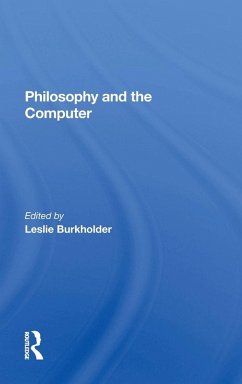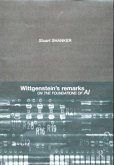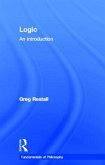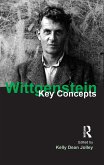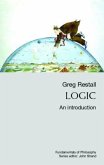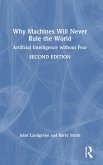Leslie Burkholder
Philosophy And The Computer
Leslie Burkholder
Philosophy And The Computer
- Gebundenes Buch
- Merkliste
- Auf die Merkliste
- Bewerten Bewerten
- Teilen
- Produkt teilen
- Produkterinnerung
- Produkterinnerung
The contributors set out to demonstrate the influence of the computer - not just in the philosophy of mind, where the influence has been enormous, but also in epistemology, metaphysics, logic and the philosophy of mathematics.
Andere Kunden interessierten sich auch für
![Wittgenstein's Remarks on the Foundations of AI Wittgenstein's Remarks on the Foundations of AI]() Stuart G. ShankerWittgenstein's Remarks on the Foundations of AI168,99 €
Stuart G. ShankerWittgenstein's Remarks on the Foundations of AI168,99 €![Logic Logic]() Greg RestallLogic168,99 €
Greg RestallLogic168,99 €![Wittgenstein Wittgenstein]() Kelly Dean JolleyWittgenstein133,99 €
Kelly Dean JolleyWittgenstein133,99 €![Complexity and Postmodernism Complexity and Postmodernism]() Paul CilliersComplexity and Postmodernism168,99 €
Paul CilliersComplexity and Postmodernism168,99 €![Logic Logic]() Greg RestallLogic35,99 €
Greg RestallLogic35,99 €![Problems of Mind Problems of Mind]() Norman MalcolmProblems of Mind116,99 €
Norman MalcolmProblems of Mind116,99 €![Why Machines Will Never Rule the World Why Machines Will Never Rule the World]() Jobst LandgrebeWhy Machines Will Never Rule the World137,99 €
Jobst LandgrebeWhy Machines Will Never Rule the World137,99 €-
-
-
The contributors set out to demonstrate the influence of the computer - not just in the philosophy of mind, where the influence has been enormous, but also in epistemology, metaphysics, logic and the philosophy of mathematics.
Produktdetails
- Produktdetails
- Verlag: Routledge
- Seitenzahl: 282
- Erscheinungstermin: 28. April 2020
- Englisch
- Abmessung: 235mm x 157mm x 20mm
- Gewicht: 563g
- ISBN-13: 9780367282875
- ISBN-10: 0367282879
- Artikelnr.: 75506681
- Herstellerkennzeichnung
- Libri GmbH
- Europaallee 1
- 36244 Bad Hersfeld
- gpsr@libri.de
- Verlag: Routledge
- Seitenzahl: 282
- Erscheinungstermin: 28. April 2020
- Englisch
- Abmessung: 235mm x 157mm x 20mm
- Gewicht: 563g
- ISBN-13: 9780367282875
- ISBN-10: 0367282879
- Artikelnr.: 75506681
- Herstellerkennzeichnung
- Libri GmbH
- Europaallee 1
- 36244 Bad Hersfeld
- gpsr@libri.de
Part 1 Epistemology and metaphysics: the computer as a laboratory for epistemology
Herbert Simon; philosophical challenges in distributed computing
Peter Barnett; SNePS - a fully intensional propositional semantic network
Stuart C. Shapiro
William J. Rapaport; the structure of extension
Christopher J. Thornton. Part 2 Philosophy of mind: representational genera
John Haugeland; the wanton module and the frame problem
Eric Dietrick and Chris Fields; why thinking isn't computing
Daryl Close; the secret operations of the mind
Saul Trager. Part 3 Logic: searching for proofs (in sentimental logic)
Wilfried Sieg and Richard Scheines; some problems on the computational representation of inference
Tryg Ager; selecting a contradiction in natural deduction theorem proving
Andrew McCafferty; automated translation from English to logic and back
Herbert E. Hendry and Joseph F. Hanna. Part 4 Algorithmics: a new paradigm for mathematics
Newcomb Greenleaf. Part 5 Ethics: should computer programs be ownable?
David H. Carey; moral responsibility and programming
Robert Zerwekh. Part 6 Computer-assisted instruction: learning ethnical decision-making
Pieter Mostert et al; finite structures in SYMLOG
Frederic D. Portoraro; an interface for deductive proof construction
Marvin J. Croy; Socratic dialogue
Don Barker and Stephen Scott; proof designer
Mark Bedau and James Moor.
Herbert Simon; philosophical challenges in distributed computing
Peter Barnett; SNePS - a fully intensional propositional semantic network
Stuart C. Shapiro
William J. Rapaport; the structure of extension
Christopher J. Thornton. Part 2 Philosophy of mind: representational genera
John Haugeland; the wanton module and the frame problem
Eric Dietrick and Chris Fields; why thinking isn't computing
Daryl Close; the secret operations of the mind
Saul Trager. Part 3 Logic: searching for proofs (in sentimental logic)
Wilfried Sieg and Richard Scheines; some problems on the computational representation of inference
Tryg Ager; selecting a contradiction in natural deduction theorem proving
Andrew McCafferty; automated translation from English to logic and back
Herbert E. Hendry and Joseph F. Hanna. Part 4 Algorithmics: a new paradigm for mathematics
Newcomb Greenleaf. Part 5 Ethics: should computer programs be ownable?
David H. Carey; moral responsibility and programming
Robert Zerwekh. Part 6 Computer-assisted instruction: learning ethnical decision-making
Pieter Mostert et al; finite structures in SYMLOG
Frederic D. Portoraro; an interface for deductive proof construction
Marvin J. Croy; Socratic dialogue
Don Barker and Stephen Scott; proof designer
Mark Bedau and James Moor.
Part 1 Epistemology and metaphysics: the computer as a laboratory for epistemology, Herbert Simon; philosophical challenges in distributed computing, Peter Barnett; SNePS - a fully intensional propositional semantic network, Stuart C. Shapiro, William J. Rapaport; the structure of extension, Christopher J. Thornton. Part 2 Philosophy of mind: representational genera, John Haugeland; the wanton module and the frame problem, Eric Dietrick and Chris Fields; why thinking isn't computing, Daryl Close; the secret operations of the mind, Saul Trager. Part 3 Logic: searching for proofs (in sentimental logic), Wilfried Sieg and Richard Scheines; some problems on the computational representation of inference, Tryg Ager; selecting a contradiction in natural deduction theorem proving, Andrew McCafferty; automated translation from English to logic and back, Herbert E. Hendry and Joseph F. Hanna. Part 4 Algorithmics: a new paradigm for mathematics, Newcomb Greenleaf. Part 5 Ethics: should computer programs be ownable?, David H. Carey; moral responsibility and programming, Robert Zerwekh. Part 6 Computer-assisted instruction: learning ethnical decision-making, Pieter Mostert et al; finite structures in SYMLOG, Frederic D. Portoraro; an interface for deductive proof construction, Marvin J. Croy; Socratic dialogue, Don Barker and Stephen Scott; proof designer, Mark Bedau and James Moor.
Part 1 Epistemology and metaphysics: the computer as a laboratory for epistemology
Herbert Simon; philosophical challenges in distributed computing
Peter Barnett; SNePS - a fully intensional propositional semantic network
Stuart C. Shapiro
William J. Rapaport; the structure of extension
Christopher J. Thornton. Part 2 Philosophy of mind: representational genera
John Haugeland; the wanton module and the frame problem
Eric Dietrick and Chris Fields; why thinking isn't computing
Daryl Close; the secret operations of the mind
Saul Trager. Part 3 Logic: searching for proofs (in sentimental logic)
Wilfried Sieg and Richard Scheines; some problems on the computational representation of inference
Tryg Ager; selecting a contradiction in natural deduction theorem proving
Andrew McCafferty; automated translation from English to logic and back
Herbert E. Hendry and Joseph F. Hanna. Part 4 Algorithmics: a new paradigm for mathematics
Newcomb Greenleaf. Part 5 Ethics: should computer programs be ownable?
David H. Carey; moral responsibility and programming
Robert Zerwekh. Part 6 Computer-assisted instruction: learning ethnical decision-making
Pieter Mostert et al; finite structures in SYMLOG
Frederic D. Portoraro; an interface for deductive proof construction
Marvin J. Croy; Socratic dialogue
Don Barker and Stephen Scott; proof designer
Mark Bedau and James Moor.
Herbert Simon; philosophical challenges in distributed computing
Peter Barnett; SNePS - a fully intensional propositional semantic network
Stuart C. Shapiro
William J. Rapaport; the structure of extension
Christopher J. Thornton. Part 2 Philosophy of mind: representational genera
John Haugeland; the wanton module and the frame problem
Eric Dietrick and Chris Fields; why thinking isn't computing
Daryl Close; the secret operations of the mind
Saul Trager. Part 3 Logic: searching for proofs (in sentimental logic)
Wilfried Sieg and Richard Scheines; some problems on the computational representation of inference
Tryg Ager; selecting a contradiction in natural deduction theorem proving
Andrew McCafferty; automated translation from English to logic and back
Herbert E. Hendry and Joseph F. Hanna. Part 4 Algorithmics: a new paradigm for mathematics
Newcomb Greenleaf. Part 5 Ethics: should computer programs be ownable?
David H. Carey; moral responsibility and programming
Robert Zerwekh. Part 6 Computer-assisted instruction: learning ethnical decision-making
Pieter Mostert et al; finite structures in SYMLOG
Frederic D. Portoraro; an interface for deductive proof construction
Marvin J. Croy; Socratic dialogue
Don Barker and Stephen Scott; proof designer
Mark Bedau and James Moor.
Part 1 Epistemology and metaphysics: the computer as a laboratory for epistemology, Herbert Simon; philosophical challenges in distributed computing, Peter Barnett; SNePS - a fully intensional propositional semantic network, Stuart C. Shapiro, William J. Rapaport; the structure of extension, Christopher J. Thornton. Part 2 Philosophy of mind: representational genera, John Haugeland; the wanton module and the frame problem, Eric Dietrick and Chris Fields; why thinking isn't computing, Daryl Close; the secret operations of the mind, Saul Trager. Part 3 Logic: searching for proofs (in sentimental logic), Wilfried Sieg and Richard Scheines; some problems on the computational representation of inference, Tryg Ager; selecting a contradiction in natural deduction theorem proving, Andrew McCafferty; automated translation from English to logic and back, Herbert E. Hendry and Joseph F. Hanna. Part 4 Algorithmics: a new paradigm for mathematics, Newcomb Greenleaf. Part 5 Ethics: should computer programs be ownable?, David H. Carey; moral responsibility and programming, Robert Zerwekh. Part 6 Computer-assisted instruction: learning ethnical decision-making, Pieter Mostert et al; finite structures in SYMLOG, Frederic D. Portoraro; an interface for deductive proof construction, Marvin J. Croy; Socratic dialogue, Don Barker and Stephen Scott; proof designer, Mark Bedau and James Moor.

